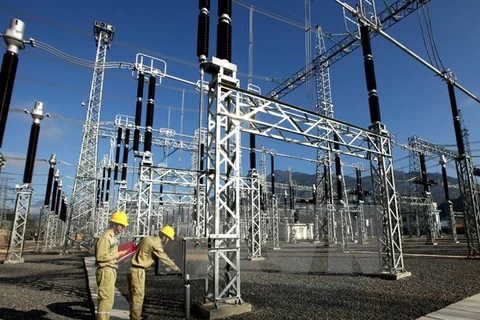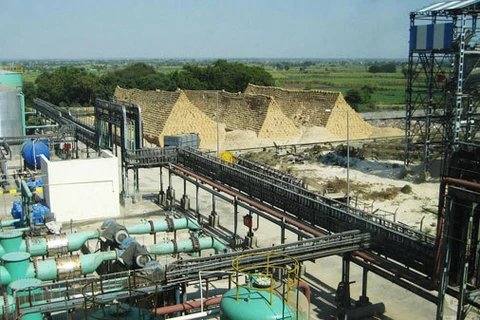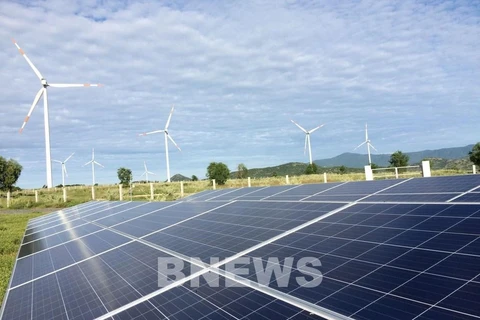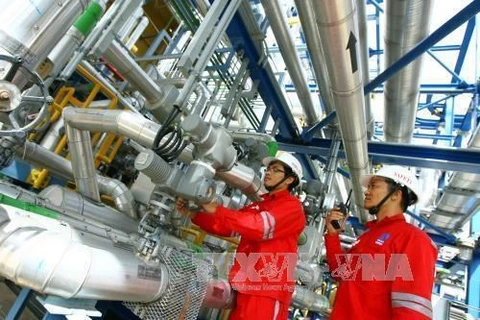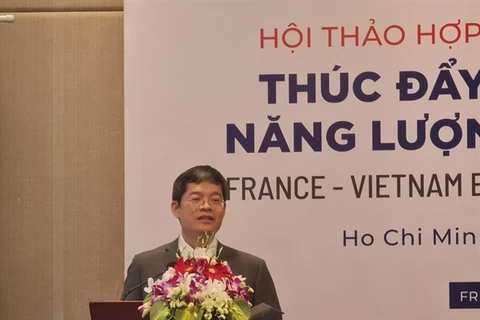Hanoi (VNA) – Electricity of Vietnam (EVN) has forecast the average electricity consumption will rise 6.4% to 793.8 million kWh per day in July, as heat waves are expected to hit the northern and central regions.
To meet the rising demand, the group said it will continue with measures to ensure electricity supply for socio-economic development and people’s daily life, while ensuring safety of the electricity system and gradually removing its financial difficulties.
Regarding electricity generation, EVN will optimise the capacity of hydro power plants with good water flows. Thermal power plants fueled by coal and gas will be operated depending on demand, while oil-fueled plants will be on stand-by.
Besides, the group will maintain construction pace on important transmission projects such as the Vung Ang – Quang Trach 500kV line and the Chu Se 220kV transformer station.
Also in July, EVN will instruct its subsidiaries to get personnel and equipment ready around the clock so as to timely respond to any situation and handle incidents.
The group reported that electricity demand rose strongly in June as all three regions in the country were hit by heatwaves. The peak electricity capacity reached a new record of 45,528 MW on June 21, surpassing the peak capacity in 2021 by nearly 3,100 MW. The daily electricity output also set a new record of 900 million kWh also on June 21.
Total electricity output in June reached 24.52 billion kWh. The figure for the first six months of the year increased by 3.8% to 133.11 billion kWh, of which hydro power plants generated 41.58 billion kWh, or 31.2% of the total. Coal-fueled plants contributed 55.79 kWh, or 41.8%, gas-fueled plants supplied 15.22 billion kWh, or 11.4%. Renewable energy accounted for 14.4% of total output with 19.2 billion kWh, with 14.25 billion kWh from solar energy and 4.67 billion kWh from wind power.
In the first months of 2022, complicated developments of the COVID-19 pandemic affected the progress of many power projects. Prices of materials rose high, foreign experts were unable to arrive in the country and there was a shortage of domestic workers. The group also faced many difficulties in coordinating with localities in ground clearance work.
However, efforts by EVN subsidiaries in ground clearance and the application of new technologies have helped accelerate the pace of key projects.
Regarding transmission projects, EVN and its subsidiaries started work on 67 projects in the first six months of the year, while putting into operation 49 electricity transmission networks.
The group is focusing resources on the expanded Ialy hydro power plant, the Quang Trach 1 thermal power plant and the Phuoc Thai solar power plants No 2 and 3.
EVN also said it will invest more in clean energy in the years ahead to meet the rising demand for power in national development.
The group has submitted to the Government its proposal on mechanisms to encourage the development of renewable energy such as wind and solar power along with storage systems.
EVN expects to put into operation around 5,500 MW of electricity from renewables, with 4,000 MW from wind power and 1.500 MW from solar power by 2025, to prevent a shortage of power, especially in northern localities.
The group has also asked the Government for permission to develop offshore wind power in the northern region to increase electricity supply for the región and ensure national power security.
Electricity demand is surging in the context of Vietnam making all-out efforts for socio-economic recovery after the COVID-19 pandemic is put under control.
According to the power development plan in 2022, EVN can ensure sufficient power supply for the central and southern regions. The northern region may face a shortage at some points of time, particularly during severe heat waves./.
To meet the rising demand, the group said it will continue with measures to ensure electricity supply for socio-economic development and people’s daily life, while ensuring safety of the electricity system and gradually removing its financial difficulties.
Regarding electricity generation, EVN will optimise the capacity of hydro power plants with good water flows. Thermal power plants fueled by coal and gas will be operated depending on demand, while oil-fueled plants will be on stand-by.
Besides, the group will maintain construction pace on important transmission projects such as the Vung Ang – Quang Trach 500kV line and the Chu Se 220kV transformer station.
Also in July, EVN will instruct its subsidiaries to get personnel and equipment ready around the clock so as to timely respond to any situation and handle incidents.
The group reported that electricity demand rose strongly in June as all three regions in the country were hit by heatwaves. The peak electricity capacity reached a new record of 45,528 MW on June 21, surpassing the peak capacity in 2021 by nearly 3,100 MW. The daily electricity output also set a new record of 900 million kWh also on June 21.
Total electricity output in June reached 24.52 billion kWh. The figure for the first six months of the year increased by 3.8% to 133.11 billion kWh, of which hydro power plants generated 41.58 billion kWh, or 31.2% of the total. Coal-fueled plants contributed 55.79 kWh, or 41.8%, gas-fueled plants supplied 15.22 billion kWh, or 11.4%. Renewable energy accounted for 14.4% of total output with 19.2 billion kWh, with 14.25 billion kWh from solar energy and 4.67 billion kWh from wind power.
In the first months of 2022, complicated developments of the COVID-19 pandemic affected the progress of many power projects. Prices of materials rose high, foreign experts were unable to arrive in the country and there was a shortage of domestic workers. The group also faced many difficulties in coordinating with localities in ground clearance work.
However, efforts by EVN subsidiaries in ground clearance and the application of new technologies have helped accelerate the pace of key projects.
Regarding transmission projects, EVN and its subsidiaries started work on 67 projects in the first six months of the year, while putting into operation 49 electricity transmission networks.
The group is focusing resources on the expanded Ialy hydro power plant, the Quang Trach 1 thermal power plant and the Phuoc Thai solar power plants No 2 and 3.
EVN also said it will invest more in clean energy in the years ahead to meet the rising demand for power in national development.
The group has submitted to the Government its proposal on mechanisms to encourage the development of renewable energy such as wind and solar power along with storage systems.
EVN expects to put into operation around 5,500 MW of electricity from renewables, with 4,000 MW from wind power and 1.500 MW from solar power by 2025, to prevent a shortage of power, especially in northern localities.
The group has also asked the Government for permission to develop offshore wind power in the northern region to increase electricity supply for the región and ensure national power security.
Electricity demand is surging in the context of Vietnam making all-out efforts for socio-economic recovery after the COVID-19 pandemic is put under control.
According to the power development plan in 2022, EVN can ensure sufficient power supply for the central and southern regions. The northern region may face a shortage at some points of time, particularly during severe heat waves./.
VNA

